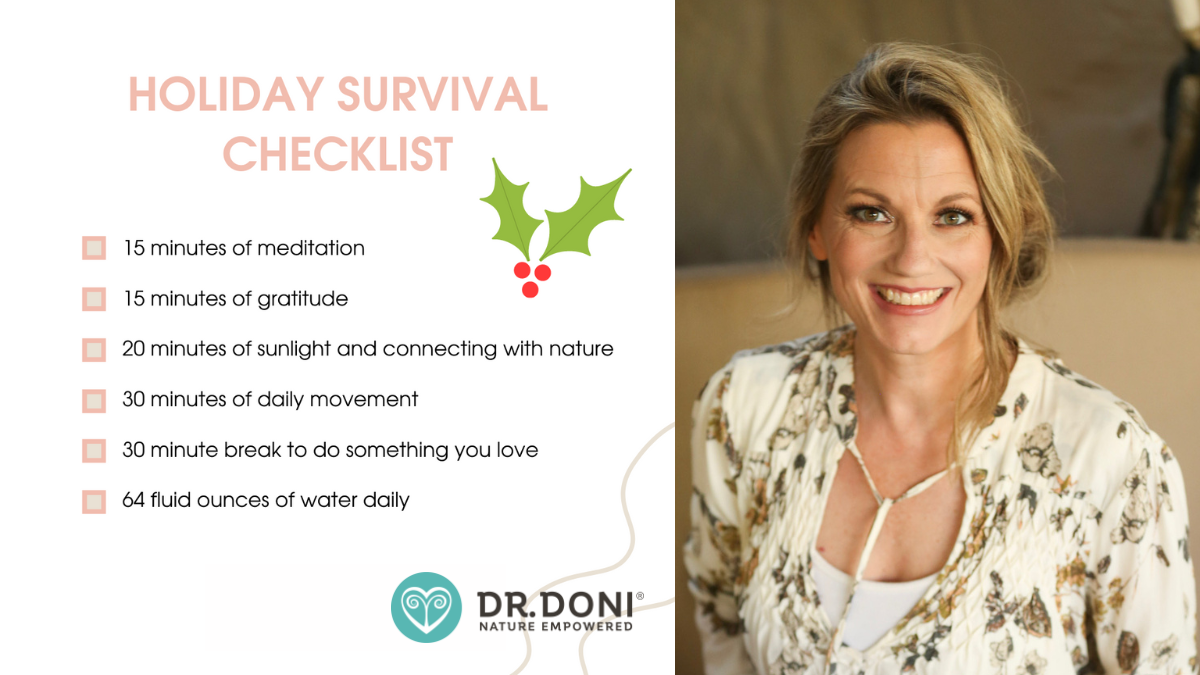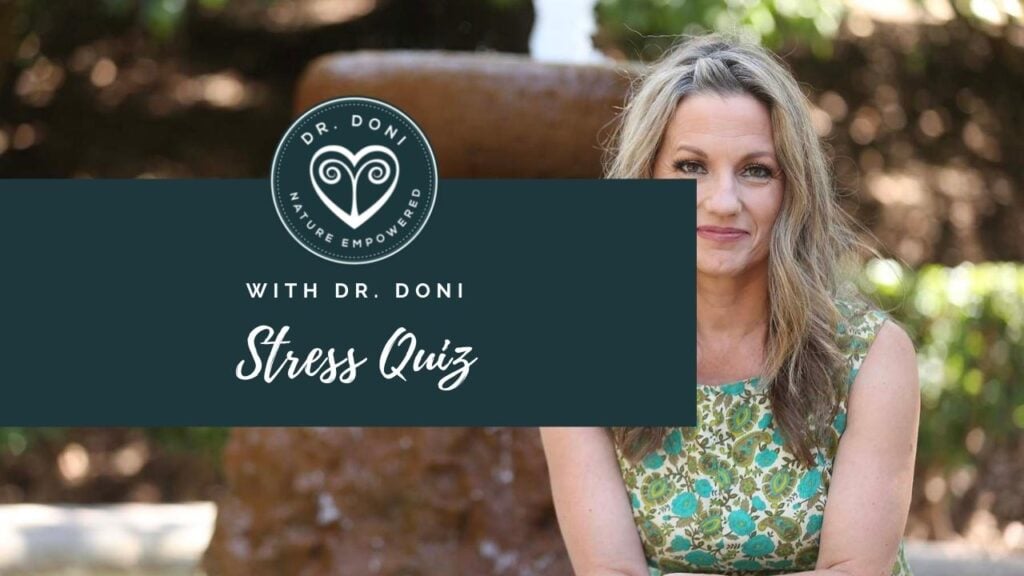
Your Holiday Survival Checklist
- Home
- Stress & Adrenal Fatigue
- Your Holiday Survival Checklist

Stress and depression have skyrocketed in the last couple of years – affecting all ages and all groups of people. As a nation, and around the world, we have been faced with a lot of stress, and statistically stress rises during the holiday season.
I was interviewed this week by Linda Hurtado live in studio on Fox 13 News (Tampa Bay), and she asked me this very question: What are the top three things that cause people stress during the holiday season?
What patients tell me stresses them is:
1. Financial worries – related to buying gifts
2. Family dynamics
and
3. Keeping up with taking care of themselves with everything else of their to-do list.
But it’s not just during the holidays, of course. Chronic stress is also known to cause anxiety, sleeplessness, weight gain, hormone imbalances, decreased fertility, and susceptibility to viruses.
Using my proven Stress Recovery Protocol, SelfC.A.R.E, which identifies how stress uniquely affects you as an individual and uses epigenetics to reoptimize your health, I created the Holiday Survival Checklist to help you Master Your Stress during the holiday season. I was glad to get to discuss it with Linda on her show.
This checklist is a list of bite-sized things you can do each day to help you through the holiday season so that stress doesn’t set you back.
The Self C.A.R.E. Protocol is a simple strategy to help counter-balance the effects of stress. I go into it in depth in my book Master Your Stress Reset Your Health.
SelfC.A.R.E. During the Holiday Season
To learn more about how you can use the SelfC.A.R.E. Protocol every day to keep health issues away, here are some quick ideas:
C = Clean eating
Start by decreasing your intake of sugar. Sugar sneaks in to our diet in so many ways – sometimes even healthy foods contain sugar. Start by limiting or eliminating sugar in your coffee or other beverages. Use less when cooking or replace with stevia, which is a sweet plant that doesn’t cause stress the way sugar does. I know it’s the holidays, but even if you can have less sugar 3 days per week, and then build on that trend, before you know it, you’ll be free of those sugar cravings and the negative effects of sugar.
Next, decrease gluten and dairy (products made from cow milk) in your diet because they can increase stress and inflammation. Start by looking for alternatives at the grocery store, and add in gluten-free and dairy-free options each week.
Eat smaller meals – just enough so you are not hungry, but not overly full. By doing this, you’re making it easier for your body to digest the food, absorb the nutrients, get glucose into your cells to make energy, and lessen inflammation, digestive trouble, and cholesterol and blood sugar issues.
Drinking water is important, and often forgotten. I also recommend adding electrolytes to your water, which can be done as simply as with a pinch of sea salt in 8 ounces of water.
A = Adequate sleep
Studies show that 7.5 to 9 hours sleep is what we should all be aiming for, every night! I know it can seem like there is so much to get done, and not enough time to sleep, but when it comes down to it, so much good stuff happens (healing and recovery in our bodies) while we sleep, if we don’t get sleep, we are working against ourselves. So we may as well face the fact that sleep is a necessity for humans.
The key is to create a bedtime routine that clearly tells your body and nervous system that you want it to go into sleep mode. That means turning down the lights, turning off your devices, and instead choosing calming music and peaceful activities, such as a hot bath or meditation.
If you are struggling to get to sleep or stay asleep, I have solutions for you. Start by taking my Stress Type Quiz, and then I’ll be able to suggest supplements to address what is disrupting your sleep and help you get the zzzs that you need. You can also get my book on sleep – The Natural Insomnia Solution – on Amazon or here on my site.
R = Recovery activities
Now here is where we get to apply everything the data tells us about how to reset our stress response, optimize cortisol and adrenaline, and help our bodies build up our anti-stress muscle. That means stopping to take deep breaths, feeling gratitude for people and things in our life, getting out in nature for even a few minutes, listening to soothing music, or singing, journaling, and calling a friend or loved one.
Start by setting a timer on your phone for once every hour. When the timer goes off, stop for 5 minutes and choose one of the activities on the recovery menu. Tell others what you are up to and they’ll likely join you. Or take some time to yourself, to allow your brain to do nothing for even one minute.
E = Exercise
Now if you haven’t been exercising and if you are feeling exhausted or in pain, then don’t expect that you’re going to be running a mile or doing an hour-long spin class. Start with 5 minutes of gentle movement. Stretch from side to side. Do a few minutes of low impact core strengthening, which you can do on your living room floor. Listen to your body and go little by little each day.
The research does prove that even small amounts of movement and exercise make a difference. Yoga is a good option, but it doesn’t have to be yoga. It can be taking your dog for a walk, or going for a short swim, or dancing to the music in your kitchen. It all counts.
For more support integrating C.A.R.E. into your routine, I created the 7-day SelfC.A.R.E. Stress Reset, which you can find here and get started right away.

Designing Your Own SelfC.A.R.E.
Now that you have the idea of C.A.R.E., the key is to implement it for you, in your way, the way your body needs it. Stress recovery is NOT one-size-fits-all. So don’t expect that your SelfC.A.R.E. is going to look like mine. The more you listen to your body and match your SelfC.A.R.E. routine to your needs and your body rhythms, the better.
I recommend doing my Stress Type Quiz to find out how stress affects you as an individual. Then I can guide you to implement SelfC.A.R.E. in a way that matches your Stress Type. I can also tell you which vitamins and herbs make the most sense for your Stress Type.
Wishing you a happy holiday, filled with self C.A.R.E., where you feel confident armed with the Holiday Survival Checklist!
My best to you and your loved ones,3.

Connect with Dr. Doni:
- Facebook https://facebook.com/drdoniwilson
- Instagram https://instagram.com/drdoniwilson
- YouTube https://youtube.com/DoniWilsonND
- Newsletter: https://doctordoni.com/www (Weekly Wellness Wisdom)
- Podcast: https://doctordoni.com/podcast (How Humans Heal)
More Resources from Dr. Doni:
- Stress Type Quiz: Assess your adrenal function
https://doctordoni.com/quiz - Dr. Doni's Book: Master Your Stress, Reset Your Health
https://doctordoni.com/book - Dr. Doni's Facebook Group: Stress Warrior Stress Resiliency
https://facebook.com/groups/stresswarrior - HPV Recovery Guide (FREE)
https://doctordoni.com/ddpp/hpv-guide/ - FREE Masterclasses with Dr. Doni
https://doctordoni.com/masterclasses - FREE Guides from Dr. Doni
https://doctordoni.com/guides
Personalized Solutions:
- 14-Day Detox Program: You can start this transformation program anytime
https://doctordoni.com/detox-program - Say Goodbye to HPV (12-week Program): Begin the journey to freedom from HPV today!
https://doctordoni.com/hpv-12-week - If you’d like to meet with Dr. Doni one-on-one for your health, request a Health Breakthrough Session: https://doctordoni.com/breakthrough
Disclaimer: This specific article and all other Content, Products, and Services of this Website are NOT intended as, and must not be understood or construed as, medical care or advice, naturopathic medical care or advice, the practice of medicine, or the practice of counseling care, nor can it be understood or construed as providing any form of medical diagnosis, treatment, cure, or prevention of any disease.
Share this Post:
Dr. Doni Wilson
14 Day Detox Program
Take the Stress Type Quiz
Dr. Doni Social Media
Popular Posts


The 5 Burnout Types

Healing HPV Holistically: Dr. Doni on the Inspire Health by Jen Podcast

Recent Podcasts
Signup to receive our weekly newsletter with all the latest news, podcasts and special offers
New Book - Order Today!

SIMPLE PRACTICES for SHIFTING FROM YOUR STATE of STRESS to YOUR FLOW and FREEDOM
MASTER YOUR STRESS
RESET YOUR HEALTH
Order Now! Related Posts

What is making you susceptible to HPV?
I have been working with women who had abnormal cells on their cervix and/or vaginally, caused by HPV for over 20 years now. And while

The 5 Burnout Types
Did you know there are 5 burnout types? They are based on your Stress Type®, which is how your adrenal function has been affected by

Healing HPV Holistically: Dr. Doni on the Inspire Health by Jen Podcast
Dr. Doni was interviewed by Jen Ciszewski on the Inspire Health by Jen Podcast, talking about how to heal away HPV from your body for good.

Stress and Trauma: The Science Behind It, How It Shows Up and How to Heal: Dr. Doni on The Burn Fat and FEAST Podcast
Dr. Doni was interviewed by Sarah B. Thomas on the Burn Fat and FEAST Podcast, talking about the impact of stress and trauma on our health and what to do to recover from them.















